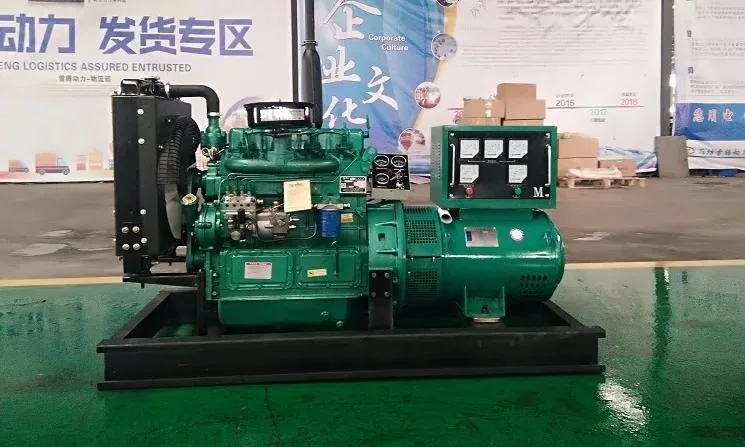Introduction
Diesel generators have long been a popular choice for providing backup power in situations where a reliable source of electricity is essential. One of the key advantages of diesel generators is their ability to efficiently and effectively meet variable load demands, making them well-suited for applications where power requirements fluctuate over time. In 30kw diesel generator for remote mining sites , we will explore the capabilities of diesel generators in handling variable load demands, the challenges associated with these fluctuations, and the strategies that can be employed to optimize the performance of diesel generators in such environments.
Understanding Variable Load Demands
Variable load demands refer to situations where the amount of power required fluctuates over time. This can occur in a wide range of applications, such as in industrial settings where production processes may vary throughout the day, or in remote locations where power needs are influenced by factors like weather conditions or time of day.
In such environments, it is essential for the power generation system to be able to adjust output quickly and efficiently to match the changing load requirements. Diesel generators are well-suited for this task due to their ability to provide reliable power on demand, with the flexibility to scale output up or down as needed.

Challenges of Variable Load Demands
While diesel generators offer versatility in handling variable load demands, there are several challenges that need to be addressed to ensure optimal performance. One of the main challenges is the need to maintain efficiency and reliability across a wide range of load conditions.
Diesel generators are most efficient when operating at or near their rated capacity. Operating at lower loads can lead to issues such as incomplete combustion, increased fuel consumption, and higher emissions. On the other hand, operating at higher loads for extended periods can put a strain on the generator and reduce its lifespan.
Another challenge is the need to respond quickly to sudden changes in load demand. Diesel generators typically have a short response time, but delays in adjusting output can lead to issues such as voltage fluctuations, which can damage sensitive equipment connected to the generator.
Optimizing Diesel Generators for Variable Load Demands
To address the challenges associated with variable load demands, several strategies can be employed to optimize the performance of diesel generators:
1. Proper Sizing: Ensuring that the diesel generator is properly sized for the expected load conditions is essential for maximizing efficiency and reliability. Undersized generators may struggle to meet peak demand, while oversized generators may operate inefficiently at lower loads.
2. Load Management: Implementing effective load management strategies can help smooth out fluctuations in power demand and reduce the strain on the generator. This can include measures such as staggered start times for equipment or utilizing energy storage systems to supplement power during peak demand periods.
3. Regular Maintenance: Regular maintenance and servicing of the diesel generator are crucial for ensuring optimal performance over the long term. This includes monitoring key parameters such as fuel consumption, exhaust emissions, and engine temperature, and addressing any issues promptly.
4. Fuel Quality: The quality of fuel used in the diesel generator can have a significant impact on its performance. Using clean, high-quality fuel that meets the manufacturer's specifications is essential for maximizing efficiency and reducing emissions.
5. Advanced Control Systems: Installing advanced control systems on the diesel generator can help improve its responsiveness to load changes and optimize fuel consumption. These systems can include features such as load sharing, automatic start/stop, and remote monitoring capabilities.
Case Study: Diesel Generator in a Manufacturing Facility
To illustrate the application of diesel generators for variable load demands, let's consider a case study of a manufacturing facility that relies on a diesel generator for backup power.
The manufacturing facility operates multiple production lines that have varying power requirements throughout the day. During peak production hours, the load on the generator is high, while it decreases during off-peak times. The facility also experiences occasional power outages due to grid failures, making the diesel generator a critical component of their backup power system.
To address the variable load demands, the facility has implemented the following strategies:
- Proper Sizing: The diesel generator was selected based on the maximum power demand of the facility during peak production hours, ensuring that it can meet the required load without operating at full capacity.
- Load Management: The facility has implemented a load shedding system that automatically switches off non-essential equipment during peak demand periods, reducing the strain on the generator.
- Regular Maintenance: The diesel generator undergoes regular maintenance checks to ensure that it is operating efficiently and reliably. This includes regular fuel quality testing, oil changes, and inspections of key components.
- Advanced Control Systems: The diesel generator is equipped with an advanced control system that allows for remote monitoring and control of the generator. This system enables the facility managers to adjust output levels and monitor performance in real-time.
Conclusion
Diesel generators are a versatile and reliable solution for meeting variable load demands in a wide range of applications. By understanding the challenges associated with fluctuating power requirements and implementing strategies to optimize performance, diesel generators can provide a cost-effective and efficient backup power solution for critical infrastructure.
As technology continues to advance, the capabilities of diesel generators in handling variable load demands are expected to improve further, with the integration of smart grid technologies and advanced control systems. By staying abreast of these developments and implementing best practices in generator operation and maintenance, businesses and organizations can ensure that their power needs are met efficiently and reliably, even in fluctuating environments.
